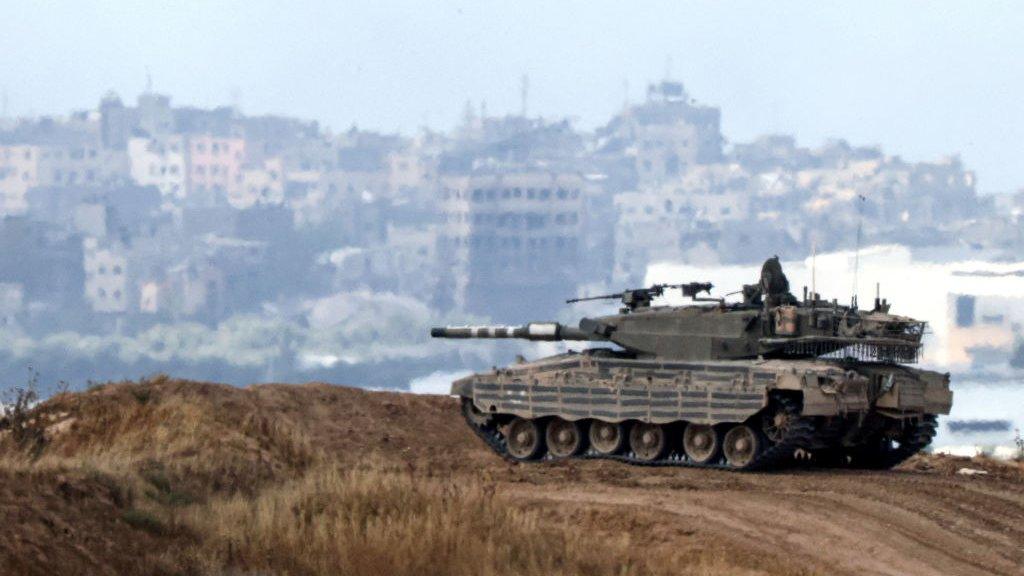Gaza war: Battles rage as Israeli troops intensify Jabalia and Rafah operations
- Published
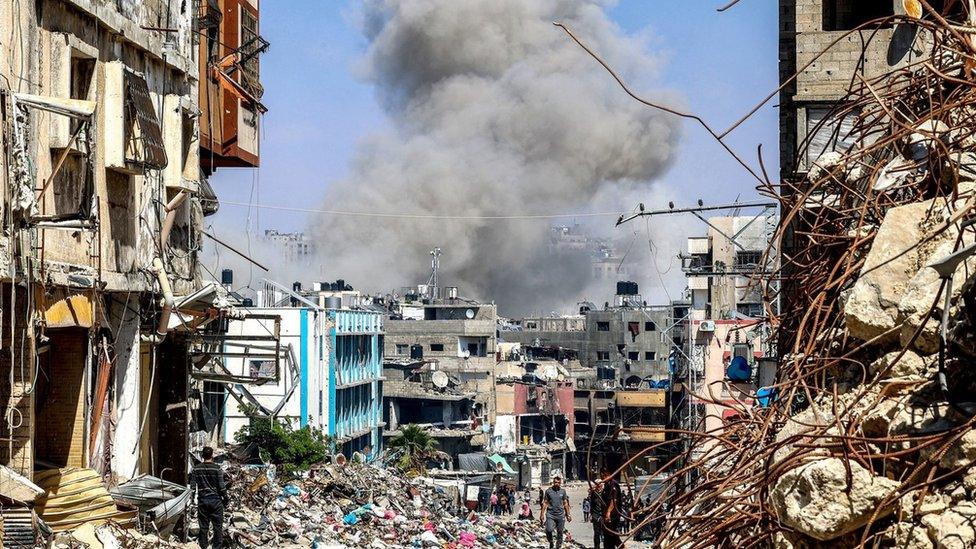
The UN said on Tuesday that 100,000 Palestinians had fled the fighting in Jabalia and elsewhere in northern Gaza
Israeli forces and Palestinian groups say there have been intense battles in the northern Gazan town of Jabalia.
Israel's military said troops had killed "a large number of terrorists" in Jabalia's refugee camp, while Hamas said it had killed several soldiers.
Tens of thousands of civilians have fled Jabalia since Saturday, when the military said it would re-enter the area because Hamas had regrouped there.
Fierce fighting is also continuing around the southern city of Rafah.
The UN says almost 600,000 people taking refuge have been displaced since the start of an Israeli ground operation in the city's eastern outskirts nine days ago, including 150,000 people in the past 48 hours.
With tanks now pushing into built-up areas and the nearby border crossings closed or inaccessible, supplies and medical services are dwindling.
US Secretary of State Antony Blinken expressed deep concern about the impact of the Israeli operation, saying there was an urgent need to restore the full operational capacity of the two Rafah and Kerem Shalom crossings to make sure humanitarian assistance got into southern Gaza.
"What we don't want to see is a situation where we've basically reversed what's happened in recent months - where assistance was working its way through in the south but very little was getting to the north," he said.
But Israeli Prime Minister Benjamin Netanyahu pushed back against criticism of the military's operation, saying: "The humanitarian catastrophe that has been spoken of has not been realised, nor will it."
Israel launched a military campaign to destroy Hamas in response to the group's cross-border attack on southern Israel on 7 October, during which about 1,200 people were killed and 252 others were taken hostage.
More than 35,230 people have been killed in Gaza since then, according to the territory's Hamas-run health ministry.
The Israel Defense Forces (IDF) said in a statement on Wednesday that troops had begun "an operation against terrorist operatives and infrastructure in the centre of Jabalia camp" overnight.
"Over the past day, IDF troops in the area have engaged in intense battles with dozens of terrorist cells and eliminated a large number of terrorists," it added.
Hamas's military wing also reported battles inside Jabalia camp on Wednesday and said fighters had targeted Israeli troops with anti-tank missiles and various other explosive devices.
It claimed that a dozen soldiers had been killed in attacks on a bulldozer, a tank and a house in the Block 4 area of the camp. The IDF did not report any casualties.
The Hamas-affiliated Safa news agency reported that air and artillery strikes had caused widespread destruction in areas where the troops had advanced.
Meanwhile, the official Palestinian news agency, Wafa, said four people were killed in an overnight Israeli air strike on a house in Jabalia town.
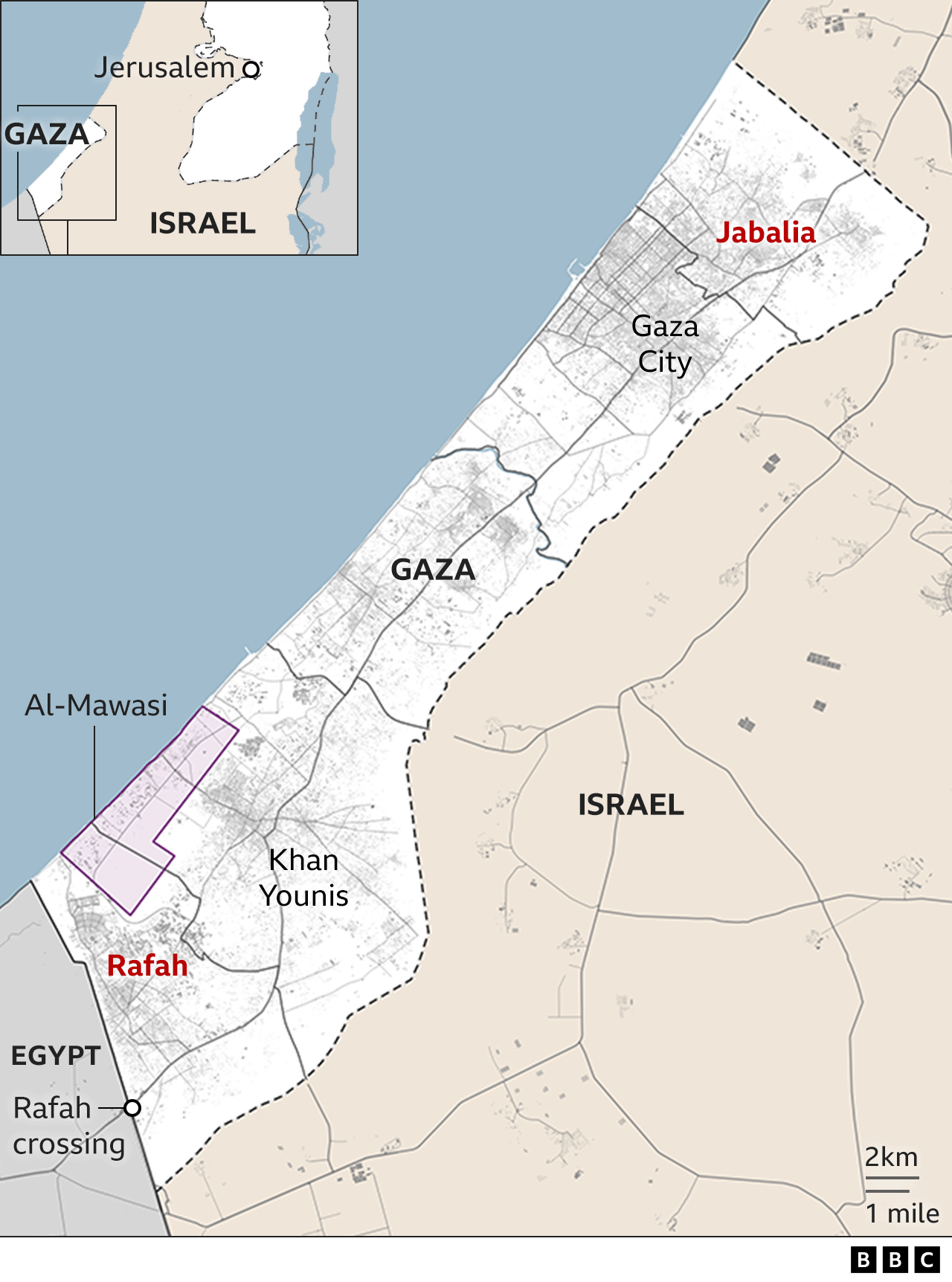
Wafa also said there had been violent shelling of the Zeitoun neighbourhood, in eastern Gaza City, from which Israeli troops withdrew on Wednesday following a separate six-day operation.
The IDF said the troops had "eliminated dozens of terrorists in encounters and airstrikes, destroyed terrorist infrastructure and located many weapons".
Residents of Zeitoun told BBC Arabic's Gaza Today programme that many had been forced to flee because of the intensity of the bombardment and fighting.
"The biggest problem we face in Zeitoun is that no ambulance or civil defence [rescue team] gets here. So, if your son is injured, he will continue bleeding before your eyes until he dies," said Atef al-Mashalti.
"Such a thing makes any father feel helpless. Fear has taken hold of my son to the point that he has to repeat the Shahadah [the Islamic declaration of faith] in anticipation of death at any moment."
On Tuesday night, Gaza's Hamas-run Civil Defence force said it had recovered the bodies of five people, including a woman and her child, in two Israeli air strikes in Sheikh Radwan and another part of Gaza City.
And on Wednesday afternoon, another strike in Gaza City reportedly killed three people who had been among a group waiting outside a shop that provided an internet signal.
The IDF said aircraft had struck about 80 "terror targets" across Gaza over the past day, including military compounds and weapons storage facilities.
Israel scaled down military operations in the north in January after declaring that it had "dismantled" Hamas's battalions there. But that left a power vacuum in which the group has been able to rebuild.
An estimated 300,000 people trapped in the devastated region are also experiencing a "full-blown famine" due to a lack of aid deliveries, according to the head of the World Food Programme.
Israel says it needs to send troops into Rafah, in the south, because Hamas's last remaining battalions are based there along with the group's leaders and surviving hostages.
The UN and Western powers have warned that an all-out ground assault could lead to mass civilian casualties and a humanitarian catastrophe.
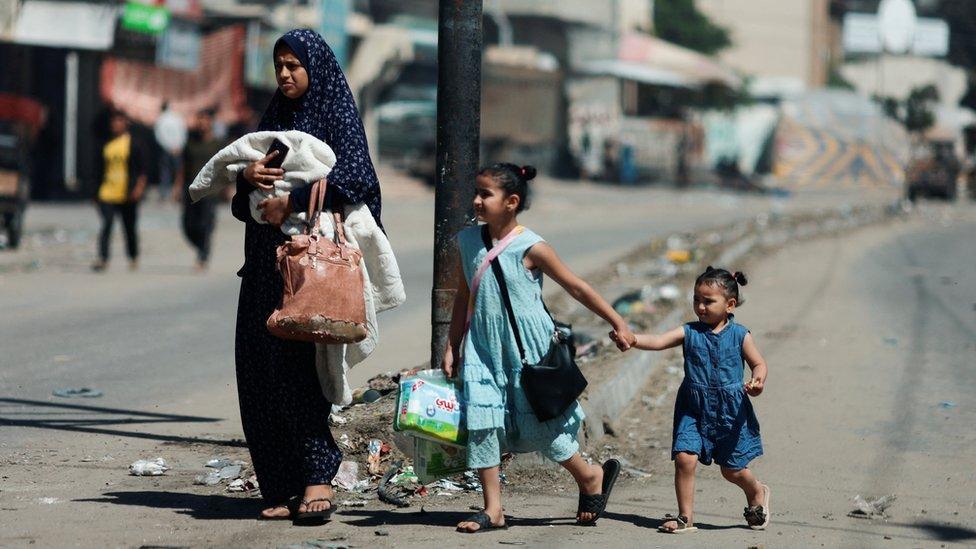
Civilians in Rafah have been told to head north towards areas which the UN says lack essential services
The IDF has ordered the evacuation of a number of neighbourhoods since 6 May, when it began what it called "precise operations in specific areas of eastern Rafah and the Gazan side of the Rafah crossing".
On Wednesday, a statement said troops had been targeting a Hamas training compound, "eliminating terrorists in close-quarters combat" and locating weapons and "equipment intended to simulate that of the IDF".
Israeli troops reportedly advanced to within less than 1.6km (1 mile) from the centre of Rafah on Tuesday, when an Israeli soldier was killed in the south.
The IDF has told displaced residents to head towards an "expanded humanitarian area", which stretches north from the coastal strip of al-Mawasi to the town of Deir al-Balah, in Gaza's Middle Area.
Hind Khoudary, a Palestinian journalist in Deir al-Balah, told the BBC that many of those who had Rafah were now sheltering there.
"Unfortunately, the Middle Area is overcrowded with people. We're talking about a very small area that is supposed to be suitable for more than one million Palestinians," she said.
"They also asked people to go to Khan Younis, but it is completely destroyed and... people don't have access to basic needs, like water."
She also noted that some of those still in Rafah could not afford to pay for a vehicle to leave or were waiting for the IDF to tell them to evacuate.
"People are tired. They have been displaced more than seven or eight times... So the situation is deteriorating every single minute," she warned.
- Published15 May 2024
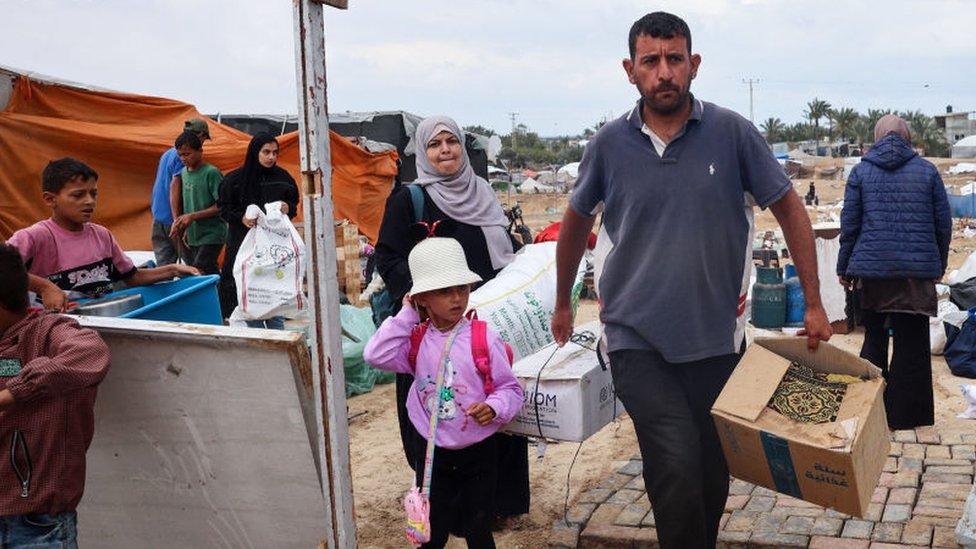
- Published15 May 2024
